上海版牛津英语七年级 上 unit3单元知识点及练习
七年级英语上册 Unit 3 Welcome to our school知识点梳理(下)(新版)牛津版
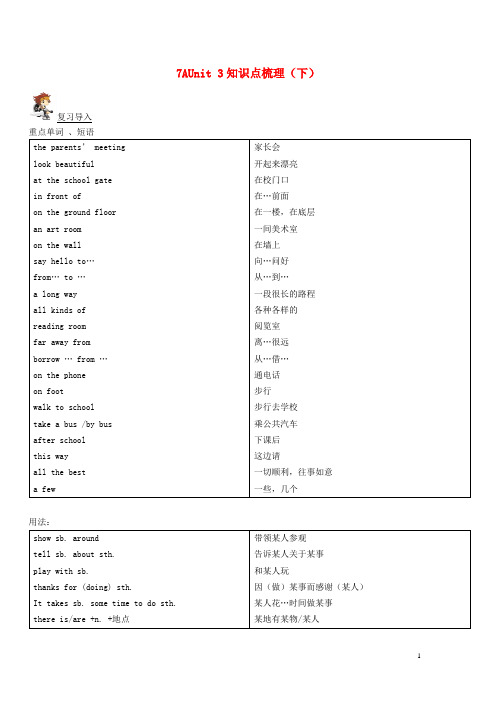
7AUnit 3知识点梳理(下)复习导入重点单词 、短语the parents ’ meeting look beautiful at the school gate in front of on the ground floor an art room on the wall say hello to … from … to … a long way all kinds of reading room far away from borrow … from … on the phone on foot walk to school take a bus /by bus after school this way all the best a few 家长会 开起来漂亮 在校门口 在…前面在一楼,在底层 一间美术室 在墙上 向…问好 从…到… 一段很长的路程 各种各样的 阅览室 离…很远 从…借… 通电话 步行 步行去学校 乘公共汽车 下课后 这边请一切顺利,往事如意 一些,几个用法:知识点梳理一.词汇&短语:WORDS&PHRASES1. Mum, look at the pictures of my friends on the walls.妈妈,看一看墙上我朋友的照片。
On the wall 意为“在墙上”。
Wall 可数名词,意为“墙”。
辨析: in the wall 与 on the wall2. Let me see. 让我想想。
Let 使役动词,意为“让,允许”。
She lets her children play in the garden.她让她的孩子们在花园里玩。
【拓展】有类似用法的词还有make和have这两个使役动词。
Mother makes her son get home earlier. 妈妈让儿子早点儿回家。
3. I like to play with them after class.我喜欢在下课后同他们玩耍。
牛津沪教版英语七年级上Unit3综合练习含答案
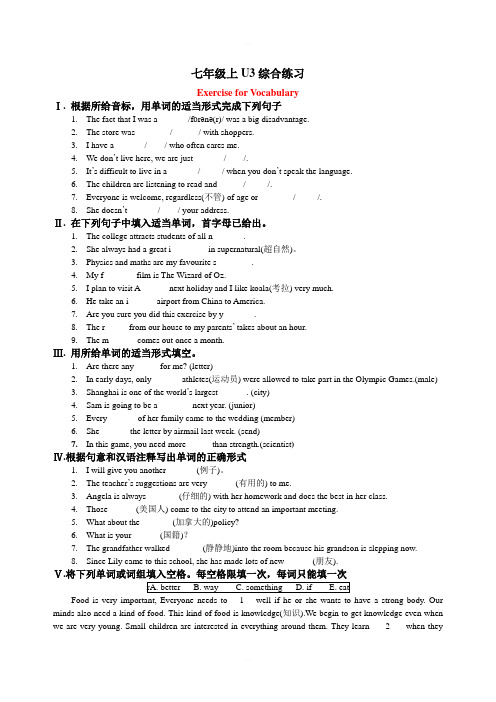
七年级上U3综合练习Exercise for VocabularyⅠ. 根据所给音标,用单词的适当形式完成下列句子1.The fact that I was a ______ /fɒrənə(r)/ was a big disadvantage.2.The store was _______ / / with shoppers.3.I have a ______ / / who often cares me.4.We don’t live here, we are just ______ / /.5.It’s difficult to live in a ______ / / when you don’t speak the language.6.The children are listening to read and _____ / /.7.Everyone is welcome, regardless(不管) of age or _______ / /.8.She doesn’t ______ / / your address.Ⅱ. 在下列句子中填入适当单词,首字母已给出。
1.The college attracts students of all n_______.2.She always had a great i________ in supernatural(超自然)。
3.Physics and maths are my favourite s________.4.My f_______ film is The Wizard of Oz.5.I plan to visit A______ next holiday and I like koala(考拉) very much.6.He take an i______ airport from China to America.7.Are you sure you did this exercise by y_______.8.The r_____ from our house to my parents’ takes about an hour.9.The m______ comes out once a month.Ⅲ. 用所给单词的适当形式填空。
牛津上海版七年级英语上册Unit3知识点讲义
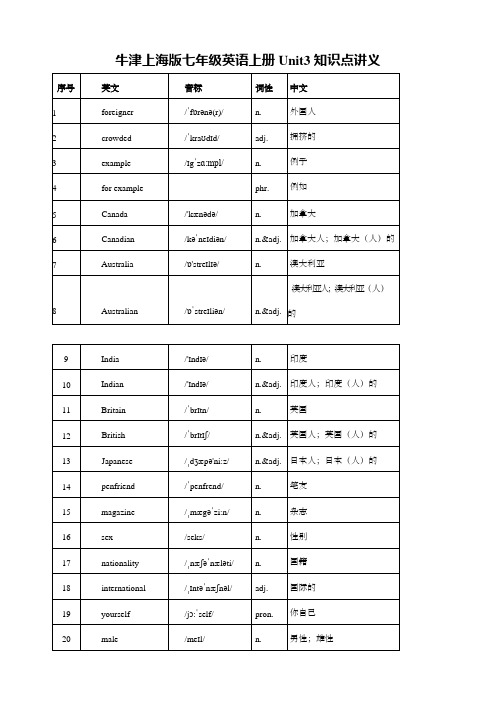
牛津上海版七年级英语上册Unit3知识点讲义知识点梳理eful words and expressions1. Garden City is a crowded city.➢be crowded with=be full of2. Over six million people live in Garden City.➢over =more than➢当表示确切的数目时,hundred, thousand, million等数词前用单数形式。
当表达不具体的数目,如成百上千,成千上万等时,hundrend, thousand等数词用复数形式,且在其后加介词of。
[e.g.] Hundred of visitors came to Shanghai every year.3. For example, there are more than twenty-eight thousand people from Canada in Garden city.➢for example一般只举同类人或物中的“一个”为例,作插入语,用逗号隔开,可置于句首、句中、句末。
[e.g.] Noise,for example,is a kind of pollution.4. —What do we call people from Canada?— We call them Canadians.➢call意为“把…称作”➢注意国家和国籍的不同表达:[e.g.] He is a boy from Canada. = The boy comes from Canada. = The boy is Canadian.➢本课已出现的及常见的国名、国籍和国名列表如下:5. Nowadays we can visit countries near or far away from China.➢near作形容词,表示1)"邻近的,接近的"。
Unit 3 (重点知识点总结及单元测试) 2020年牛津译林版七年级上册英语同步讲义
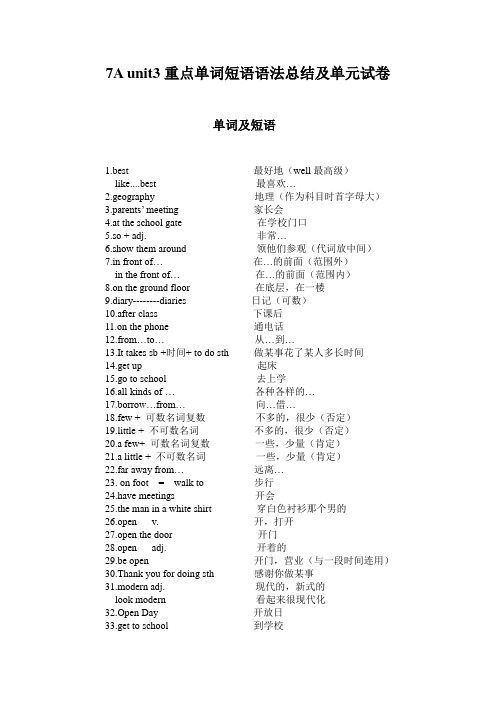
7A unit3重点单词短语语法总结及单元试卷单词及短语1.best 最好地(well最高级)like....best 最喜欢…2.geography 地理(作为科目时首字母大)3.parents’ meeting 家长会4.at the school gate 在学校门口5.so + adj. 非常…6.show them around 领他们参观(代词放中间)7.in front of… 在…的前面(范围外)in the front of… 在…的前面(范围内)8.on the ground floor 在底层,在一楼9.diary--------diaries 日记(可数)10.after class 下课后11.on the phone 通电话12.from…to… 从…到…13.It takes sb +时间+ to do sth 做某事花了某人多长时间14.get up 起床15.go to school 去上学16.all kinds of … 各种各样的…17.borrow…from… 向…借…18.few + 可数名词复数不多的,很少(否定)19.little + 不可数名词不多的,很少(否定)20.a few+ 可数名词复数一些,少量(肯定)21.a little + 不可数名词一些,少量(肯定)22.far away from… 远离…23. on foot = walk to 步行24.have meetings 开会25.the man in a white shirt 穿白色衬衫那个男的26.open v. 开,打开27.open the door 开门28.open adj. 开着的29.be open 开门,营业(与一段时间连用)30.Thank you for doing sth 感谢你做某事31.modern adj. 现代的,新式的look modern 看起来很现代化32.Open Day 开放日33.get to school 到学校语法人称代词1.人称代词是用来代替表示人和物的名词。
沪教牛津版英语七年级上册各单元综合练习(期末复习)附答案
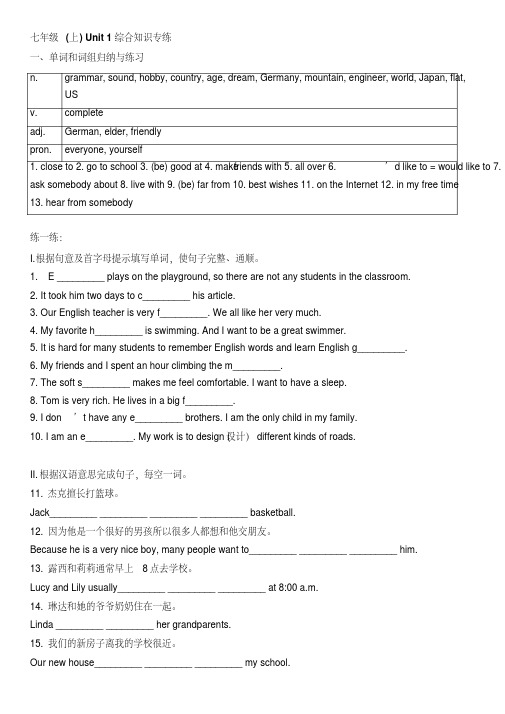
七年级(上) Unit 1综合知识专练一、单词和词组归纳与练习n. grammar, sound, hobby, country, age, dream, Germany, mountain, engineer, world, Japan, flat, USv. completeadj. German, elder, friendlypron. everyone, yourself1. close to2. go to school3. (be) good at4. make friends with5. all over6. ’d like to = would like to7. ask somebody about8. live with9. (be) far from 10. best wishes 11. on the Internet 12. in my free time13. hear from somebody练一练:I.根据句意及首字母提示填写单词,使句子完整、通顺。
1. E _________ plays on the playground, so there are not any students in the classroom.2. It took him two days to c_________ his article.3. Our English teacher is very f_________. We all like her very much.4. My favorite h_________ is swimming. And I want to be a great swimmer.5. It is hard for many students to remember English words and learn English g_________.6. My friends and I spent an hour climbing the m_________.7. The soft s_________ makes me feel comfortable. I want to have a sleep.8. Tom is very rich. He lives in a big f_________.9. I don’t have any e_________ brothers. I am the only child in my family.10. I am an e_________. My work is to design (设计)different kinds of roads.II.根据汉语意思完成句子,每空一词。
初中英语 牛津上海七年级上册Unit3 Friends from other countries知识点及语法点讲解

U3 Friends from other countries重要单词1.crowded adj.拥挤的Shanghai is a crowded city.上海是一个拥挤的城市。
【联想】crowd1)n.人群There was a large of crowd of people in the town hall.市政厅内聚集了一大群人。
2)v.聚集,挤满People quickly crowded round when there is a street accident.当有交通事故的时候人们很快围拢过来。
2.call v.命名,取名,把……叫做……;打电话We'll call the baby Jean. 我们要给小宝宝取名为简。
I'll call you long distance tonight. 今晚我给你打长途。
【短语】call on sb.拜访某人call at some place拜访某地call off取消call up征集(入伍)3. also, as well, either, too四者都可以表示“也”。
also一般放在行为动词之前,be动词之后;as well多用于句中或句尾;either用于否定句的句尾,too用于肯定句的句中或句尾。
He likes sports. He likes music, too. 他喜欢体育,也喜欢音乐。
He likes sports and music as well.He likes sports. He also likes music.Lily wasn't late for school. I wasn't late for school, either.莉莉上学不迟到,我也不迟到.4.different adj.不同的Your method is different from mine. 你的方法和我的不同。
英语七年级上牛津上海版Unit3基础练习(含答案)

英语七年级上牛津上海版Unit3基础练习(含答案)Ⅰ. Look and spell.1 It is always very _____ in Nanjing Road Walkway.2Da Shan is from _______ .3I borrowed this _____ from the school library.4My favourite outdoor activity is playing .5Jack is my penfriend. He often writes to me.6This is a photo of my _____ .Ⅱ.Choose the proper words from the brackets to complete the sentences. 1What do we call people from __ (Britain, British)?2I've visited the UK. It's (near, far away) from China.3Would you like to write to a penfriend in (another, other) country? 4I like English best. It's my favourite (food, subject).5Thank you _________ (for, to) your help.Ⅲ.Complete the sentences with the given words in their proper forms.1.Shanghai is really a (crowd) city in the east of China.2.My _________ (nation) is Chinese.3.My penfriend is a ___ (Canada).4.John moved from _____ (Australian) to China with his parents last year.5.Help _________ (you) to some fruits.6.The _________ (Britain) like going to different pubs at weekends.7.People from different __ (country) visit Singapore during their holidays.Ⅳ. Fill in the blanks with the given verbs in their proper forms.1Miss Guo ________ (read) a magazine in the reading room now.2Tim is interested in _ (cycle).3John __________ (see) the film three times. He knows a lot about it.4Can you ________ (speak) a little Japanese?5We'd like ______ (help) the people in poor areas.参考答案Ⅰ. 1. crowded 2. Canada 3. magazine 4. badminton 5. letters 6. familyⅡ. 1. Britain 2. far away 3. another 4. subject 5. forⅢ. 1. crowded 2. nationality 3. Canadian 4. Australia 5. yourself/ yourselves 6. British 7. countriesⅣ. 1. is reading 2. cycling 3. has been 4. speak 5. to help。
英语七年级上牛津上海版Unit3综合练习(含答案)

英语七年级上牛津上海版Unit3综合练习(含答案)I. Fill in the blanks with proper forms of the given words(用所给词的适当形式填空):1. Mr Green is an _______________ (Australia).2. How many _______________ (country) have you visited?3. I will fly to _______________ (Japanese) next week.4. What’s your _______________ (nation)?5. The supermarket is always _______________ (crowd) with people at weekends.6. We call people from Canada _______________ (Canada).II. Fill in the blanks with the given verbs in their proper forms(用所给动词的适当形式填空):1. Miss Guo _______________ (read) a magazine in the reading room now.2. Tim is interested in _______________ (cycle).3. John _______________ (see) the film three times. He knows a lot about it.4. Can you _______________ (speak) a little Japanese?5. We’d like _______________ (help) the people in poor areas.III. Choose the best answer(选择最恰当的答案):( ) 1. Li Dong is a(n) __________ boy, but he can speak __________.A. Chinese, JapanB. China, BritainC. American, ChinaD. Chinese, Japanese( ) 2. Is there anything in your __________ hand?A. the othersB. the otherC. anotherD. other( ) 3. Look, Mary is so __________ when she is reading an __________ book.A. exciting, interestingB. exciting, interestedC. excited, interestingD. excited, interested( ) 4. The rent(租金)for this flat __________ $500 last year, but nowit __________ $600.A. cost, costsB. costs, costsC. costs, costD. cost, cost( ) 5. There are over __________ books in our school library.A. two thousandsB. two thousandC. thousandsD. thousands of( ) 6. What do we call people from __________?A. AustraliaB. BritishC. ThaiD.Indian( ) 7. __________ does your penfriend look like?A. HowB. WhatC. WhereD. Which( ) 8. What subject are you best __________?A. inB. withC. forD. at( ) 9. Most of __________ students have watched World Cup at __________ home.A. /, theB. the, /C. the, theD. /, / ( ) 10. It’s already 7 o’clock. Mary __________ come yet.A. hasB. hasn’tC. haveD. haven’tIV. Rewrite the sentences as required(按要求改写句子):1. I have already to drive a car. (改为否定句)I _______________ learnt to drive a car _______________.2. Danny watches TV twice a week. (就划线部分提问)How _______________ _______________ Danny watch TV?3. The train has already arrived. (改为一般疑问句)_______________ the train arrived _______________?4. Over six million people live in Hong Kong. (就划线部分提问)_______________ _______________ people live in Hong Kong?5. How is your Chinese teacher like? (保持句意基本不变)_______________ does your Chinese teacher look _______________?V. Read and tell True or False(阅读并判断正误):I had a very nice surprise this evening. A few minutes after dinner, there was a knock at the front door. To my surprise, it was Johnny Smith. “Hi, Tony!” he said. “Hello, Johnny!” I said. “What are you doing here?”Johnny is an American. He left my school and went back to America last year with his parents. He said he came back because his father would have anotherjob here. They were going to live here for another two years. I was really happy to hear that. We were good friends when he was here before. I asked him to come in. I took him in to see my mother and father. They were both very happy to see him. Dad said, “Now Tony can get help with his English homework again.” But that’s not why I was happy for Johnny to come back.I was happy because he was really my good friend.( ) 1. Tony was surprised because his old friend got a job here.( ) 2. Tony knew that his friend would come to see him before he had dinner. ( ) 3. Johnny’s father probably worked in Tony’s country a year ago. ( ) 4. Johnny’s father would work in Tony’s country for another two years.( ) 5. Tony was glad to see Johnny because Johnny could help him with his English.VI. Read and choose(阅读选择正确的答案):Steve was a bit frightened. This was his first time to travel by air. He did not know how to find his seat, so he went up to an air hostess(空姐)and asked, “Excuse me, I can’t find my seat.”The air hostess showed him the seat and told him to sit down and fasten (系)his seat belt. She told Steve, “Don’t move about when the plane takes off.” She also said to Steve, “Your ears may feel a little funny. But you don’t need to worry about it because many people feel like this.”“What can I do during the flight?” asked Steve.“You can read magazines, book, newspaper or watch films.”“What shall I do if I feel thirsty?”“You can call me, and I will bring you drinks.”“Thank you! And I’m sure that I will enjoy this flight.”( ) 1. Steve was a bit frightened because __________.A. he was going to travel alone(单独)B. he was going to take a plane for the first timeC. he did not know how to fasten his seat belt( ) 2. Steve could not find his seat because __________.A. it was his first time to travel by planeB. the seat numbers were not clearC. the air hostess did not tell him( ) 3. The underlined part “move about” means __________.A. talk to each otherB. move aroundC. look here and there( ) 4. The air hostess told Steve not to worry about __________ when the plane was going up.A. his earsB. the funC. the planeVII. Reading comprehension(阅读理解):A. Choose the best answer(根据短文内容,选择最恰当的答案):A Real Life Spider-ManPARIS, France—As a child, Alain Robert was afraid of heights. One day, when he was 12, he returned home from school. At the front door of his building, he looked for his keys. He didn’t have them. It was 3:30 pm and his parents worked until 6:00 pm. Alain looked at his apartment on the eighth floor. He saw an open window. He closed his eyes and imagined himself climbing the building. When he opened his eyes, he told himself, “I can do it.” Fifteen minutes later, he was in his house and his fear of heights was gone. Today, Alain still, climbs buildings. In 2003, he climbed a building in London dressed as Spider-Man to advertise the movie. In 2004, he climbed Taipei 101 (one of the tallest buildings in the world). To reach the top of a building, Alain uses only his hands and special shoes.Alain climbs as a hobby. He also does it to make money for charity (for children and the homeless). When he climbs, he wants to send a message to people. If you have something you really want to do, it can become real. But you must be brave and keep trying. If something bad happens, don’t give up. Close your eyes and tell yourself, “I can do it.”Choose the right answer.( ) 1. Alain Robert first climbed the tall building ________.A. in 2003B. in 2004C. at 6:00p.m.D. at the age of 12( ) 2. What was he afraid of when he was a child?A. Dogs.B. Mouse.C. Heights.D. Cats.( ) 3. Alain Robert climbed the tall building in London to ________.A. advertise the movie Spider-ManB. make the movie Spider-ManC. enter his apartmentD. make money for British children( ) 4. Alain Robert climbs Taipei 101________.A. in 2003B. in 2004C. in 2005D. in 2006( ) 5. Alain Robert climbs buildings ________.A. for fun and exerciseB. for his healthC. for fun and charityD. for exercise and his job( ) 6. If something bad happened in your life, you should _________.A. give upB. tell other peopleC. keep on tryingD. shout at other peopleB. Choose the words or expressions and complete the passage(选择最恰当的单词完成短文):It’s hard to find a job in BritainLife used to be fun for teenagers. They used to have money to spend, and happytime to spend. They used to ___1___ teenage clothes, and meet in teenage coffeebars and discos. Some of them still do. But for many young people, life is harder now. Jobs are difficult to ___2___. There’s not so much money around. Things are more expensive, and it’s hard to find a place ___3___. Teacherssay that students work ___4___ than they used to. They are less interestedin politics, and more interested in passing exams. They know that good exam results may bring them better jobs.Most young people worry more ___5___ money than their parents did twenty years ago. They try to spend less and take more. They want to be able to have houses of their own one day.For some, the answer to unemployment (失业) is to leave home and look for jobs in one of Britain’s big cities. Every day ___6___ young people arrive in London from other parts of Britain, looking for jobs. Some find jobs, and stay. Others don’t, and go home again.When you read the newspaper and watch the news on TV, it’s easy to get the idea that British young people lose their jobs and are in trouble.A. wearB. put onC. wearingD. putting on () 1.A. find outB. findC. look forD. look at() 2.(A. liveB. live inC. to liveD. to live in ) 3.A. harderB. hardC. more hardlyD. hardly() 4.(A. aboutB. withC. thanD. on) 5.(A. hundredB. hundredsC. hundreds ofD. hundred of ) 6.C. Read the passage and fill in the blanks with proper words(在短文的空格内填入适当的词,使其内容通顺,每空格限填一词,首字母已给):Best friends“You’re my best friend.” It’s the nicest thing you can s____1____ your happiness and sadness with someone.Good friendships begin in middle schools. It’s the place you begin to develop your own personality(个性). Your parents aren’t around so you can s____2____ lots of time every day sharing your life with your classmates. You talk with them, you work with them and you make friends with them. But not a____3____ of them will become your “best” friend.Best friends are the people who like you and u ____4____ you most. They are the ones who are easy to work with and easy to have fun with. Sometimes it’s e____5____ to find a best friend. And sometimes you can f____6____ a little lonely. But just because you don’t have a best friend at the moment, it doesn’t mean you won’t have one in the future. Best friends seem to find each other as if by magic. And when you find your best friend, the magic will last forever.D. Answer the questions(根据短文内容回答下列问题):Bill’s part-time jobBill was fourteen years old and in the seventh grade. He had a part-time job which got him up at fi ve o’clock. He was a newspaper boy.Each morning, Bill left the house at five fifteen to go to the corner. The newspapers had been sent to the corner by truck at midnight. He always rode a bike to carry them. In the winter it was still dark when he got up, but during the rest of the year it was bright. Bill had to send the newspapers to the houses in all kinds of weather. He tried to put each paper in the box where it would be kept safe from wind, rain or snow. His customers thought he did a good job. Sometimes they gave him tips.Bill made about $70 each month, and he was saving some of the money to go to college. He spent the rest on tapes and clothes. Once a month he had to get the money from his customers together. Since many of them worked during the day, Bill had to get the money at night. Sometimes when Bill was ill, his elder brother had to send the newspapers. Bill had 70 customers now, but he hoped to get more soon. Some day, if he got many more customers, perhaps Bill could win a prize for being a very good newspaper boy. He wanted to wina visit to Europe, but he would be happy if he won a new bike.1. Where did Bill get the newspapers every morning?______________________________________________________________________ 2. How did Bill carry the newspapers?______________________________________________________________________ 3. Did Bill send newspapers on a rainy day?______________________________________________________________________ 4. How much money did Bill make each month?______________________________________________________________________ 5. Who would help Bill send the newspapers when he was ill?______________________________________________________________________ 6. How many customers did Bill have?______________________________________________________________________VIII. Writing(作文):Jack is a boy in Britain. You saw his name on International Pen pals. He would like to make friends with students in China. He is interested in music and playing tennis.Write a letter to Jack to introduce your basic information, your family and so son.Introduce your hobbies and favourite subjects at school. Ask Jack to write to you soon.参考答案I. Australian countries Japan nationality crowded CanadiansII. is reading, cycling, has seen, speak, to helpIII. DDCAB ABDBBIV. haven’t ... yet, often does, Has ... yet, How many, What ...LikeV. FFTTFVI. BABAVII. A. 1—6 DCABCC B. 1—6 ACDAACC. 1. share 2. spend 3. all 4. understand 5. easy 6. feelD. 1. The corner. 2. By bike. 3. Yes, he did. 4. $70. 5. His brother. 6. 70/ Seventy.VIII. Reference version:Dear Jack,It’s so nice to see your name and information on International Pen Pals. I’m a boy from Shanghai, a big city in China. I’m 13 years old and study in a Junior Middle School in Shanghai.What a coincidence! I’m keen on music and sports, too. I like playing tennis very much. There are four people in my family. They are my father, mother, sister and me. We are a happy family. The enclosed is a photo of us. The boy in the middle is me!My favourite subjects are music and English. I think they are interesting. After school, I sometimes play tennis with my sister or go cycling at weekends.I like different kinds of music, such as pop, jazz and classic music. Rock and roll is not my cup of tea. What kind of music do you like best?There is a saying. “A friend is a second self.” Could you write to me and tell me something about yourself? I’m looking forward to hearing fromyou .Yours, XXX。
牛津上海版7AUnit 3知识点及语法点
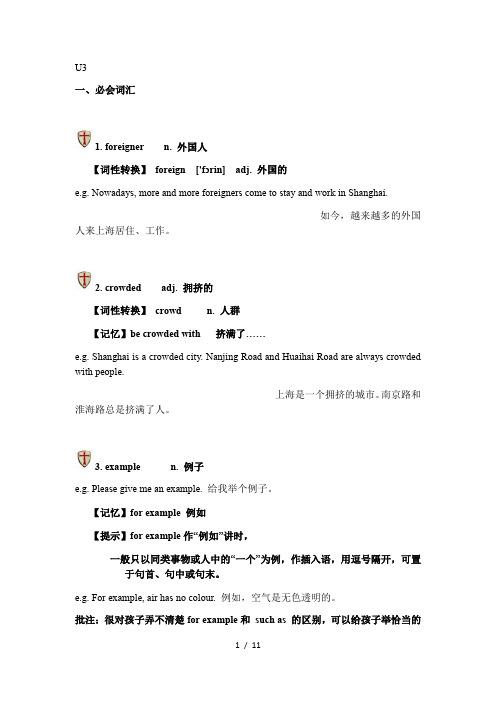
U3一、必会词汇1. foreigner n. 外国人【词性转换】foreign ['fɔrin] adj. 外国的e.g. Nowadays, more and more foreigners come to stay and work in Shanghai.如今,越来越多的外国人来上海居住、工作。
2. crowded adj. 拥挤的【词性转换】crowd n. 人群【记忆】be crowded with 挤满了……e.g. Shanghai is a crowded city. Nanjing Road and Huaihai Road are always crowded with people.上海是一个拥挤的城市。
南京路和淮海路总是挤满了人。
3. example n. 例子e.g. Please give me an example. 给我举个例子。
【记忆】for example 例如【提示】for example作“例如”讲时,一般只以同类事物或人中的“一个”为例,作插入语,用逗号隔开,可置于句首、句中或句末。
e.g. For example, air has no colour. 例如,空气是无色透明的。
批注:很对孩子弄不清楚for example和such as 的区别,可以给孩子举恰当的例子,方便孩子理解。
4. Canada n. 加拿大【词性转换】Canadian n. & adj. 加拿大人;加拿大(人)的(它可数否?答:可数)(它的复数怎么变?答:直接加s)e.g. I am Canadian. 我是加拿大人。
(这里的Canadian是形容词,相当于I am from Canada. 我来自加拿大)e.g. I am a Canadian. 我是一个加拿大人。
(这里的Canadian是名词,表示“加拿大人”,因此前面加上不定冠词a)【注意】Canadian的复数形式是Canadians批注:细心的老师会发现,这课的重点是不同国家名称及某国人的形式,个人觉得在教学课程中,要帮助孩子总结规律,这是个人在教学中总结的规律,有不全面的地方,“中国日本单复同,英国法国man变men,其他全部加s”5. Australia n. 澳大利亚【词性转换】Australian n. & adj. 澳大利亚人;澳大利亚(人)的6. India n. 印度【词性转换】Indian n. & adj. 印度人;印度(人)的7. Britain n. 英国【词性转换】British n. & adj. 英国人;英国(人)的e.g. He speaks British English. 他说英国英语。
上海版牛津英语七年级上unit3单元知识点及练习

复习unit3 单词、短语、重点句子和语法一、单词:核心词汇名词可数名词field — a field — two fieldsquiz — a quiz —three quizzesa ground — four groundsland — a land — two landsproblem — a problem — four problemsFact — a fact — several facts不可数名词the Earth(地球)— the Moon(月亮) — the Sun(太阳)pollution(n.)— pollute(v.)=make sth dirtyenergy (n.) — clean energy(清洁能源)— heat energy(热能)二、短语/固定搭配:1、短语:provide …with…put…into…find out throw awaybe covered by on earthin the sky a lot ofmake energy of coursefor example one quarterthree quarters at hometake a look come fromfind out different types ofin the end get cooler2、固定搭配:call sth. sth.provide sb. with sth.stop doing sth.it be +形容词+ for sb. +to do sth.let sb. do sth.help sb. do sth.ask sb. (to) do sth.keep sb. + 形容词三、经典句型:There are also many people like you and me on earth.It is important for us to protect the earth for our future.What is the weather like in different places on earth?四、重点短语1.protect the Earth保护地球protect sb/sth from doing我们必须保护那片森林免受火灾。
沪教牛津版英语七年级上册各单元综合练习(期末复习)附答案

七年级(上) Unit 1综合知识专练一、单词和词组归纳与练习n. grammar, sound, hobby, country, age, dream, Germany, mountain, engineer, world, Japan, flat, USv. completeadj. German, elder, friendlypron. everyone, yourself1. close to2. go to school3. (be) good at4. make friends with5. all over6. ’d like to = would like to7. ask somebody about8. live with9. (be) far from 10. best wishes 11. on the Internet 12. in my free time13. hear from somebody练一练:I.根据句意及首字母提示填写单词,使句子完整、通顺。
1. E _________ plays on the playground, so there are not any students in the classroom.2. It took him two days to c_________ his article.3. Our English teacher is very f_________. We all like her very much.4. My favorite h_________ is swimming. And I want to be a great swimmer.5. It is hard for many students to remember English words and learn English g_________.6. My friends and I spent an hour climbing the m_________.7. The soft s_________ makes me feel comfortable. I want to have a sleep.8. Tom is very rich. He lives in a big f_________.9. I don’t have any e_________ brothers. I am the only child in my family.10. I am an e_________. My work is to design (设计)different kinds of roads.II.根据汉语意思完成句子,每空一词。
Unit3知识点梳理2023-2024学年牛津译林版英语七年级上册

第三讲 7A Unit3 Language Point 梳理1.让某人(不)做某事let/ make/ have sb. (not) _____ sth.get/ tell/ ask sb. (not) _____ sth.2. 九大建议句型两个祈使句:Let’s do….Shall we do…?两个Why:Why not sb. do…?Why don’t sb. do…?两个about:What about doing…?How about doing…?两个would:Would you like to do…?Would you please do…?⭐had better do….3.walk to spl. 步行去某地= go to spl. on foot类似用法:骑车去某地ride to spl.= go to spl. by bike ( on one’s bike)开车去某地drive to spl. =go to spl. by car (in one’s car)坐公交/地铁去某地take the bus/underground to spl.= go to spl. by bus/ underground (on the bus/underground)①和某人一起散步walk with sb.带某人去散步take sb. for a walk②遛狗walk one's dog = take the dog for a walk③去散步go for a walk= take a walk= go walking④five minutes’ walk(易错)=()How far is it from here to you school?It’s about twenty __________ (minute) walk.4.I walk to my bowl many times a day. (ic) 我一天走向我的碗好几次。
牛津沪教版英语七年级上Unit3综合练习
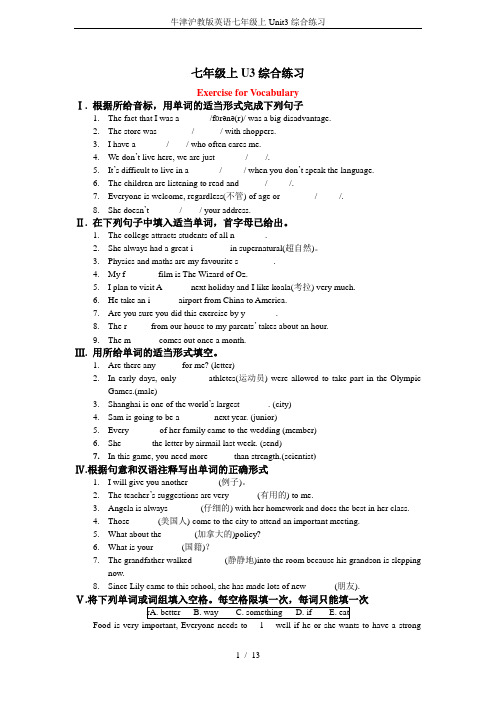
七年级上U3综合练习Exercise for VocabularyⅠ. 根据所给音标,用单词的适当形式完成下列句子1.The fact that I was a ______ /fɒrənə(r)/ was a big disadvantage.2.The store was _______ / / with shoppers.3.I have a ______ / / who often cares me.4.We don’t live here, we are just ______ / /.5.It’s difficult to live in a ______ / / when you don’t speak the language.6.The children are listening to read and _____ / /.7.Everyone is welcome, regardless(不管) of age or _______ / /.8.She doesn’t ______ / / your address.Ⅱ. 在下列句子中填入适当单词,首字母已给出。
1.The college attracts students of all n_______.2.She always had a great i________ in supernatural(超自然)。
3.Physics and maths are my favourite s________.4.My f_______ film is The Wizard of Oz.5.I plan to visit A______ next holiday and I like koala(考拉) very much.6.He take an i______ airport from China to America.7.Are you sure you did this exercise by y_______.8.The r_____ from our house to my parents’ takes about an hour.9.The m______ comes out once a month.Ⅲ. 用所给单词的适当形式填空。
牛津译林版七年级英语上册知识点第三单元

基础义务教育资料Unit 3 Topic1 1 English is widely spoken throughout the world.一. 重点单词foreign —foreigner busy—business—businessman communicate—communicationimpossible—possible twin—twins lay—laid—laid speak—speaker Europe—European tour—tourist—tourism power--powerful lead—leading--leader二·词组。
stick sth on sp. 把。
贴在be ready for sth 为某事准备好了can’t wait to do sth 迫不及待做某事have a good chance to do sth 有一个好的机会去做某事throughout / all over the world 全世界from now on 从现在开始millions of 数以百万计的be pleased with 对。
感到满意pack one’s bags 打包行李on business 出差the night table 床头柜the official language 官方语言be similar to / be the same as / be different from和。
相似和。
一样和。
不一样have trouble/difficulty (in) doing sth 做某事有困难ask sb for help 向某人求助explain (sth) to sb 向某人解释某事get along with sb 与某人相处be in trouble 处于麻烦中divide into…把。
分成the largest number of people 最多数量的人mother tongue 母语the base language 基础语言international business 国际商业the world’s airlines 国际航空in many different fields of life 在生活的很多不同领域go abroad 出国play an important part in our lives 在我们生活中扮演重要角色a powerful country 一个强大的国家take the leading position in 在某方面处于领先地位encourage sb to do sth 鼓励某人做某事be popular with sb. 受某人的欢迎make great progress in doing sth 在某事上取得巨大的进步require sb to do sth 要求某人做某事in the rest of 在。
牛津上海版七年级上册Module3语法点综合复习与巩固练习(无答案)
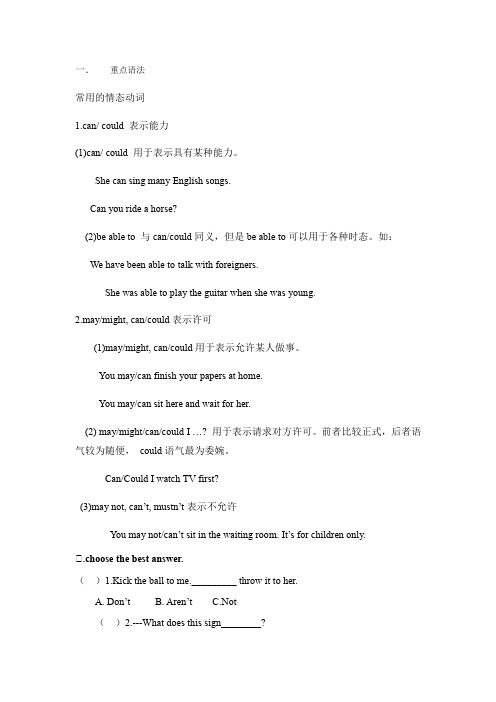
一.重点语法常用的情态动词1.can/ could 表示能力(1)can/ could 用于表示具有某种能力。
She can sing many English songs.Can you ride a horse?(2)be able to 与can/could同义,但是be able to可以用于各种时态。
如:We have been able to talk with foreigners.She was able to play the guitar when she was young.2.may/might, can/could表示许可(1)may/might, can/could用于表示允许某人做事。
You may/can finish your papers at home.You may/can sit here and wait for her.(2) may/might/can/could I …? 用于表示请求对方许可。
前者比较正式,后者语气较为随便,could语气最为委婉。
Can/Could I watch TV first?(3)may not, can’t, mustn’t表示不允许You may not/can’t sit in the waiting room. It’s for children only.Ⅰ.choose the best answer.()1.Kick the ball to me._________ throw it to her.A. Don’tB. Aren’tC.Not()2.---What does this sign________?---It________ you shouldn’t walk on the grass in the park.A.mean;meanB. means;meansC.mean; means()3.The signs________ the lake say ‘No cycling’. We can’t cycle here.A. aroundB. roundC.a round()4. Mum’s coat is black. ________ is white.A. HeB. MineC. Your()5.________ you see the sign over there?A. canB. can’tC. Can’t()6.---Can I ask you a question?----No, you can’t. You________ ask the teacher.A. willB. shouldC. would()7. Which is the first day of the week?_________________.A. MondayB. SundayC. Saturday()8. The boys _________ books in the classroom now.A. are looking atB. are readingC. are seeing()9. The park keeper ________ a sign on the grass.A. pointsB. point toC. points to()10. There’s _________ English book over there. ________ English book is Sarah’s.A. the; AnB. an; AnC. an; The()11----Would you like some_____________?----Just a little.A.apple juicesB.carrotsC. orangeD.pears()12.--__________________________?--Yes,I’d like some green tea.A.What would you like?B.What can I do for you?C.Can I help you?D.A.B.C.()13.Some ___________noodles are nice.A.tomato and eggsB.tomatoes and eggsC.tomato and eggD.tomatos and eggs()14.---Would you like go swimming with us?---______________________.A.No, I wouldn’tB.Yes,I wouldC.Yes, I’d loveD.Yes, I’d love to()15.---Would you like some orange?---______________________.A.Yes, it is.B.Yes, pleaseC.No,I wouldn’tD.Yes, I would()16.---_____________rice would you like?---Medium, please.A.How manyB.What size bowl ofC.What sizeD.What kind()17.---_________________?---Yes,I’d like some bread.A.What are you doing?B.What do you want?C.Can I help you?D.Do you love bread?()18._________like some ice cream and salad.A.He wouldsB.he doesC.He’dD.He wouldn’t()19.We all know beef is ____________meat.A.a kindB.kind ofC.a kind ofD.kind()20.Old Mike has lots of_____________on his farm.Heeats___________every day.A.chicken;chickenB.chickens;chickenC.chicken;chickensD.chickens;chickens( )21.-I am Jim Green. -is my family name.A..JimB.Jim GreenC.GreenD.Green Jim( )22.-What’s your favorite______?BasketballA.sportB.colorC.subjectD.movie( )23.-May I help you?-.A.No,you can’t.B.Yes,please.C.Yes,you can.D.Sorry.( )24.____the man? He is Kate’s father.-.A.What’s.B.Who’sC.Whose’sD.How’s( )25.She can English.A. speakingB.speakC.speaksD.to speak( )26.-Thank you very much.-.A.Thank you very muchB. All rightC.You’re welcomeD.You don’t thank me.( )27.-What color is it?-It’s orange.It’s orange pen.A.a,anB.an,anC.an,-D.-,an( )28.Mrs. Green is Jim’s mother.Jim is her .A.brotherB.sisterC.sonD.daughter( )29.-What you doing?-I’m a book.A.do,seeingB.are,lookingC.do,watchingD.are,reading ( )30.December is _____month of a year.A.twelveB.the twelvethC.the twelfthD.first.( )31.A:My name is Marry. B: I am Jenny.___A.What’s your name?B.Who are you?C.Hello!D.Nice to meet you! ( )32.Does he have a volleyball?Yes, he____.A.doB.haveC.isD.does( )33.Do you like ____?A.bananasB.appleC.strawberrysD.coffees( )34.This story sounds_____.Which is wrong(错误的).A.interestingB.dearC.boringD.scary( )35.___? My birthday is June 1st.A.Where were you born?B.Where are you?C.When is your birthday?D.When is her birthday( )36. Tom ______ carefully but could ____ nothing.A. listened, hearB. heard, listen toC. listened to, listenD. heard, hear fromII. Fill in the blanks with the proper forms of the given words:1. They can see many _____________ (difference) signs in the park.2. Our teacher ______________ (warning) us not to play ball games in the corridoryesterday.3. Can you tell me the ____________ (mean) of this sign?4. Many American young people go ___________ (hike) on their holidays.5. We can store a lot of ______________ (inform) in our computer.6. At the _____________ (begin) of the lesson, the teacher told us a story.7. Though the old man was __________ (die), the doctor was trying his best to savehim.8. I saw a big dog ____________ (lie) in front of his house.9. Last night we __________ back home until the teacher left school. (not go)10. Comrade Li Dazhao __________ in prison in 1927. (put)11. Where is professor Lee?He __________ to the library. He'll come back soon. (go)12. We could not help __________ after we heard the story. (laugh)13 Would you please __________ me an English-Chinese dictionary when you come? (bring)14.He told me that he __________ the Great Wall the year before. (visit)15. I'll tell him the news as soon as he __________ back. (come)16. I twenty pounds for the drawing.(花)III. Rewrite the sentences as required:1. It is a direction sign. (划线提问)__________________________________________?2. This sign means: we must not leave rubbish. (划线提问)。
七年级英语上册 Unit 3 Welcome to our school知识点梳理(上)(新版)牛津版

7A Unit 3知识点梳理(上)词汇导入知识点梳理一.词汇&短语:WORDS&PHRASES1. Which of the subjects do you like best, Eddie? 埃迪,你最喜欢哪一门学科?Which 疑问代词,意为“哪一个”,在表示对特定对象中的一个进行提问,经常使用“Which of”的句式。
这些计划中哪一个是最好的?_______________________________ Which of these plans is best?你最喜欢哪个季节?_______________________________Which season do you like best?2. You like Maths? 你喜欢数学?此处陈述句加问号,朗读时用升调,表示疑问,一般用来表示对某事不确定、惊奇或怀疑等。
你是一名教师?_______________________________You are a teacher?3. I have two cakes,and you have one. 我有两块蛋糕,你有一块。
句中的one是代词,并非数词,它代替上文提到的一类人或事物中的任一个,其复数形式为ones。
这些书不错,我想买一本。
_______________________________These books are good. I want to buy one.解析:one与itone 代词泛指用来指代前面提到过的一类人或事物中的一个,复数形式是onesit 代词特指代替上文中提到的事物本身,其复数形式为they我有一些苹果,你想要一个吗?_______________________________I have got some apples. Do you want one?(one 指代上句中apples中的一个)我有一支新钢笔,我喜欢它。
上海牛津版英语七年级上册七上7AUnit3U3同步讲义教案

学员编号:年级:课时数:学员姓名:辅导科目:英语学科教师:授课类型T Unit3(牛津7上)同步梳理教学目标1、使学生能够基本掌握牛津7年级上册Unit3中的基础词汇及重要句型;授课日期及时段T同步-U3基础知识梳理(建议时间:5分钟)你有笔友麽?他/她是来自哪个国家的呢?一、词汇Words (建议20分钟,老师边讲边要求学员记住单词,此环节结束之后要求学员记住80%)1. foreigner n. 外国人【词性转换】foreign ['fɔrin] adj. 外国的e.g. Nowadays, more and more foreigners come to stay and work in Shanghai.如今,越来越多的外国人来上海居住、工作。
2. crowded adj. 拥挤的【词性转换】crowd n. 人群【记忆】be crowded with 挤满了……e.g. Shanghai is a crowded city. Nanjing Road and Huaihai Road are always crowded with people.上海是一个拥挤的城市。
南京路和淮海路总是挤满了人。
3. example n. 例子e.g. Please give me an example. 给我举个例子。
【记忆】for example 例如【提示】for example作“例如”讲时,一般只以同类事物或人中的“一个”为例,作插入语,用逗号隔开,可置于句首、句中或句末。
e.g. For example, air has no colour. 例如,空气是无色透明的。
批注:很对孩子弄不清楚for example和such as 的区别,可以给孩子举恰当的例子,方便孩子理解。
4. Canada n. 加拿大【词性转换】Canadian n. & adj. 加拿大人;加拿大(人)的(它可数否?答:可数)(它的复数怎么变?答:直接加s)e.g. I am Canadian. 我是加拿大人。
- 1、下载文档前请自行甄别文档内容的完整性,平台不提供额外的编辑、内容补充、找答案等附加服务。
- 2、"仅部分预览"的文档,不可在线预览部分如存在完整性等问题,可反馈申请退款(可完整预览的文档不适用该条件!)。
- 3、如文档侵犯您的权益,请联系客服反馈,我们会尽快为您处理(人工客服工作时间:9:00-18:30)。
复习unit3 单词、短语、重点句子和语法一、单词:核心词汇名词可数名词field — a field — two fieldsquiz — a quiz —three quizzesa ground — four groundsland — a land — two landsproblem — a problem — four problemsFact — a fact — several facts不可数名词the Earth(地球)— the Moon(月亮) — the Sun(太阳)pollution(n.)— pollute(v.)=make sth dirtyenergy (n.) — clean energy(清洁能源)— heat energy(热能)二、短语/固定搭配:1、短语:provide …with…put…into…find out throw awaybe covered by on earthin the sky a lot ofmake energy of coursefor example one quarterthree quarters at hometake a look come fromfind out different types ofin the end get cooler2、固定搭配:call sth. sth.provide sb. with sth.stop doing sth.it be +形容词+ for sb. +to do sth.let sb. do sth.help sb. do sth.ask sb. (to) do sth.keep sb. + 形容词三、经典句型:There are also many people like you and me on earth.It is important for us to protect the earth for our future.What is the weather like in different places on earth?四、重点短语1.protect the Earth保护地球protect sb/sth from doing我们必须保护那片森林免受火灾。
翻译:2.provide sb with sth. = provide sth. for sb.为某人提供某物=give sb sth=give sth to sb【拓展】supply sb with sth. = supply sth. to sb.为某人提供某物offer sb sth. = offer sth. to sb提供某人某物太阳给我们提供光和热。
翻译:3.make energy制造能源4.put … into …把……倒入……他们把废水倒入河中。
翻译:和put 相关的短语:put on put off put out5.stop doing sth停止做某事stop sb from doing sth阻止某事发生stop to do sth.停下来去做(另一件)事王先生进来时,我们停止了谈话。
翻译:当我们在街道上碰见时,我们停下来说话。
翻译:6.throw away扔掉不要乱扔废纸。
翻译:7.a report on/about …关于…的一个报告8.keep sb/sth. safe保证某人/某物的安全keep sb. /sth+ 形容词保持某人/某物外套能使你暖和。
翻译:我们尽最大的努力使我们的学校保持干净、整洁。
翻译:9.take a look at sw.看一看某地10.on Earth在地球上我们生活在地球上。
翻译:on earth 还有“到底,究竟”的意思,置于what, when等疑问词后,以加强问句的语气这到底是什么东西?翻译:on earth 还可以作“世上”解,用于最高级以后,以加强语气我是世界上最幸福的人。
翻译:相关短语:on the land在陆地上in the sky在天上under the water在水下11.go with sth.与……相配;适合于12.lift sth up举起某物13.keep sth alive使某物继续存在/使某物继续下去e from sw.= be from sw.来自(于)15.ask sb (not) to do sth.要求某人(不)做某事ask sb for sth向某人要某物16.make sth. clean/dirty使某物干净/弄脏make sb do sth.使某人做某事17.at the beginning of …在……之初【拓展】at the end of在……结尾;在……末端18.some …some…一些……一些……这里有许多花园,一些是大的,一些是小的。
翻译:19.burn sth=set sth on fire 燃烧某物她把书全烧了。
翻译:20.fewer and fewer 越来越少形容词比较级+and+形容词比较级越来越…….我们的国家变得越来越强大。
翻译:常考句型1.There are forests and rivers, mountains and fields.(地球上)有森林和河流,山脉和田野。
【辨析】there be表示“某时/某地有某人/某物”,强调存在关系;have 表示“拥有”,强调所属关系。
2.All plants need light and water. 所有的植物都需要阳光和水。
→ Light and water are needed by all plants.need sb./sth. to do sth. 需要某人/物做某事我需要你帮我。
翻译:need to do sth. 需要做某事你需要马上去那儿。
翻译:3.There are also many people like you and me on Earth.地球上也有很多像你我一样的人。
= There are many people like you and me on Earth, too.【辨析】also, too, either三者都表示“也”,also和too可以互换,都可以用于肯定句和疑问句,但also常放在句中;too常放在句末,too前面要加逗号;either只用于否定句。
4.The Earth provides us with air, water and food. 地球给我们提供空气,水和植物。
= The Earth provides air, water and food for us.5.It is important for us to protect the Earth for our future.为了我们的未来,保护地球很重要。
= To protect the Earth for our future is important.“I t+be+形容词+for+sb.+动词不定式短语”句型,意为:对某人来说做某事是……it 在句首做形式主语,后面的动词不定式短语才是句子的真正主语。
对我们来说学英语很重要。
翻译:对我们来说学好英语很有用。
翻译:练习:I.根据句意及首字母提示写单词,补全句子。
1. We all live on E_________.2. It is a good design (设计) p_________ for us to learn.3. This morning, we have a q _________ about Maths.4. We must p_________ ourselves because there are many dangerous things.5. Today, it's my turn to make a r_________ on studying.II.根据句意及汉语提示写单词,补全句子。
6. The arm is a_________(部分) of our body.7. There are many plants on the_________(陆地).8. There are many kinds of vegetables(蔬菜)in the _________(田野).9. The box is too _________ (大的) for you to carry.10. The country _________ (提供) people with fruit.11. There is a lot of _________(污染) in this city.12. I have no _________ (能量) to go on running!III.根据汉语提示补全句子,每空一词,缩写算一词。
13.中国有许多漂亮的地方。
There are many _________ _________in China.14.关于地球你知道些什么?What do you _________ _________the Earth?15.这场考试对我来说很重要。
This exam is very _________ _________me.16.不要在房子里烧东西,因为很危险。
_________ _________things in the house, because it's dangerous.17.你必须按时睡觉。
You _________ _________to bed on time.18.爸爸告诉我不要杀鸟儿。
Father tells me not _________ _________birds.19.我有许多书。
有些有趣,有些无聊。
I have many books. _________are interesting and _________ are boring.20.我们必须停止工作。
We must _________ _________.21.今天天气如何?_________ the weather _________today?22.图书馆有许多不同的书。
There are _________ _________ _________ in the library.IV.从下面的方框中选择适当的单词或短语并用其正确形式填空,补全句子。
put ... into, protect ... from, in the sky, much23. There is _________ rubbish in the place.24. We can see a lot of kites _________ _________ _________.25. The little girl _________her hands _________ her pockets.26. We should _________ our eyes _________ being hurt(被伤害).五、名词的数名词按其所表示的事物的性质可分为可数名词和不可数名词两类。
